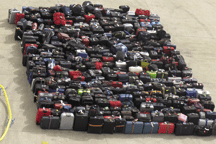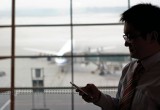David C. Wyld is a Professor of Management at Southeastern Louisiana University, where he directs the Strategic e-Commerce Initiative.
In recent months, news on the United States’ airlines has been bleak. With rising fuel prices, high cost structures and cut-throat competition from start-ups, America’s legacy carriers are struggling to stay in the air and out of bankruptcy. Yet despite hardship these airlines are piloting bold IT projects to help deliver passengers their baggage to destinations domestic and abroad.
To that end Delta Air Lines became the first air carrier to announce that it would RFID-enable its baggage handling system wide by 2007.
The Airlines’ Baggage Problems
The world’s airlines currently handle approximately two billion checked bags annually. As such, baggage handling is a very expensive proposition for air carriers, fraught with the potential for your bag to end-up in St. Louis, Senegal rather than St. Louis, Missouri.
The current standard for baggage tracking is dependent on correct readings along the line of a bar-coded label, bearing a 10-digit IATA (International Air Transport Association) number. Gartner’s Research Director, Jeff Woods, commented that “bags are very well tracked right now” by the airlines and their bar code-based systems. Yet, this is little consolation when it is your bag that is lost. The baggage tracking systems of the world’s airlines are mature, and even under the best of conditions, bar code technology works in correctly reading only 8 or 9 bags out of every 10 correctly. This means that the airlines continue to devote considerable time and energy to manually intervene to correctly direct the right bags onto the right flights, while spending great amounts of money to reunite passengers with their bags when the system breaks down.
In Delta’s case, the airline estimates that in the end, .7% of all checked luggage is actually “lost” in its present system. However, the airline estimates that it spends upwards of $100 million annually to return these bags to their rightful owners and provide compensation to passengers whose luggage is never found. Delta estimates that the full implementation cost of its RFID-based tracking system will ultimately fall somewhere between $15 and $25 million for its 81 airport locations . While this represents a significant investment, the ROI equation shows that this cost can be recouped in a single quarter of operations. Delta plans to use passive tags, which will cost the airline 25 cents each initially. However, the airline hopes that the cost of the tags will drop to approximately 5 cents a unit by the time the system is fully implemented in 2007.
Over and above the documentable cost of lost luggage, there is also a significant loss of goodwill in airline customers when their baggage is misdirected or even worse, lost. Based on the recently released Airline Quality Rating 2004 report, Delta has now fallen to last among the twelve major U.S. airlines in consumer perceptions of service quality, with mishandled baggage being a key component of the airline quality equation. When Delta is evaluated in conjunction with its major regional airline partner, Atlantic Southeast Airlines, Delta is presently last in terms of its baggage handling abilities. Thus, there is a great room for improved luggage handling to lead to less quantifiable gains in overall customer satisfaction.
Delta’s RFID Solution
Delta’s envisioned RFID-enabled baggage system will give the company the ability to track a bag from the time a passenger checks it in at his/her departing airport till the time the bag is claimed at the baggage carousel at the arrival airport. At check-in, the RFID tag’s serial number will be associated with the passenger’s itinerary. Delta will position fixed readers at check-in counters and on conveyor belts where the bags are sorted. The airline will also equip baggage handlers with portable readers and outfit aircraft cargo holds with readers built into them. RFID readers can also be located so as to scan bags as they are loaded/unloaded from the ULDs (unit load devices – the large pre-packed containers of luggage that are loaded onto the plane). Through this surveillance system, Delta should be able to all but eliminate the problem of misloaded and misdirected checked luggage, and the attendant costs of reuniting the lost bag with the passenger. Ramp and flight crews will be able to make certain that the right luggage is on board before an aircraft takes off. Pat Rary, a Delta bag systems manager, illustrated the fact that RFID will allow the airline to take proactive customer service steps on baggage problems. He observed that: “With this technology, we won’t have to wait for the customer to come tell us that the bag is lost. We can tell the customer it’s on the wrong plane and start responding before it’s a crisis. Eventually, RFID should be able to signal an arriving passenger’s cell phone with news of how long it will be before the bag is on the carousel.”
In the fall of 2003, Delta implemented a pilot test of an RFID tracking system for checked luggage on flights between Jacksonville, Florida and its hub in Atlanta, Georgia.
In the Spring of 2004, Delta implemented another pilot RFID baggage-tracking system at its Cincinnati, Ohio hub.
Through the two test programs, Delta learned several valuable lessons. It saw that tag antennas could be damaged by the static electricity generated along the conveyor systems. While for the most part, tag reading accuracy was at 98-99%, Delta found that the lowest scanner accuracy rate (96.7%) was experienced when attempting to scan bags inside the unit load devices. The ULDs are made of metal with canvas doors, and the metal housing impeded the radio signals. Delta plans to now coat its ULDs with a material that can better reflect the radio waves. While the test programs were conducted in rather neutral weather environs, concerns were raised over the ability of the tagging systems to function in harsher environments, such a Delta’s western hub in Salt Lake City, Utah. Finally, there is a famous American commercial from Samsonite that shows a gorilla in his cage, tossing the bag around and eventually stomping on the suitcase. The obvious message is that checked bags are not always handled “delicately” by the humans or the machinery as it passes through baggage systems. Thus, it must be noted that baggage handling itself can damage or detach labels/tags, and concerns over the durability of the RFID-tag are genuine.
In a widely read article in Scientific American, Roy Want predicted that airline baggage tracking will be one of the first commercially viable RFID applications. In the view of AIM Global, with the proven accuracy and effectiveness of RFID-enabled baggage tracking, it may just be a matter of time before the TSA mandates that such automatic identification technology-based systems be employed in the U.S. However, Delta stands to gain a customer service coup by being a first mover in this technology.
The Need for Standards
Paul Coby, Chief Information Officer of British Airways, believes that the airline industry needs to work together to ensure that investments in technologies such as RFID will yield the fullest possible ROI and customer service benefits. He suggested that the International Air Transport Association (IATA) should play a leading role in driving this technology, so as to ensure that the industry adopts common standards. Coby commented that “for technology to fully bring business change, the whole industry needs to move forward.” In June, Delta and United jointly proposed a RFID-specification for baggage to the IATA. The need for a unique air transport standard is obvious for the not-so-distant future, looking to the day when luggage will contain many items with their own RFID tags, say on Gillette razors, Benetton shirts, and items purchased from Wal-Mart.



